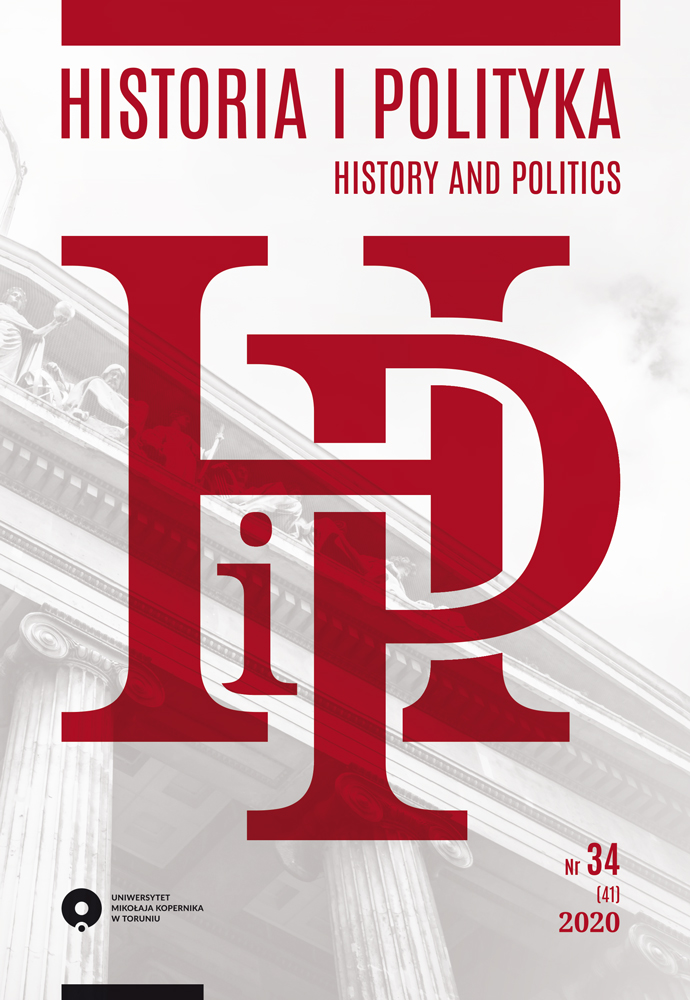German Unification in the Works of British and American Researchers in 1945–1949: Pro et Contra
DOI:
https://doi.org/10.12775/HiP.2020.033Słowa kluczowe
British historiography, American historiography, German Question, Morgenthau’s line of argument, Kennan’s line of argument, Cold WarAbstrakt
In the paper, the main approaches of British and American researchers to the analysis of German unification prospects in 1945–1949 are stated. The key arguments of supporters and opponents of the united Germany are determined, chronological periods of each approach’s prevalence on the pages of foreign publications established, and the key historical events that determined the final predominance of the supporters of the Germany’s partition identified. Finally, two main trends within the framework of this approach are stated, and the essential characteristics of them defined.Bibliografia
Mr. Byrnes’ Statement on Germany. (1946). Chronology of International Events and Documents, 2(17), 547–549.
Berkes, R.N. (Winter 1946–1947). Germany: Test Tube of Peace. The American Scholar, 16(1), 46–56.
Brown, L.H. (1948). American Economic Policy Relating to Germany and Western Europe. Proceedings of the Academy of Political Science, 22(4), 79–90. DOI: 10.2307/1172873.
Bryan, F.J. (1991). George C. Marshall at Harvard: A Study of the Origins and Construction of the ‘Marshall Plan’ Speech. Presidential Studies Quarterly, 21(3), 489–502.
Craig, G.A. (1949). Germany between the East and the West. Proceedings of the Academy of Political Science, 23(3), 2–11. DOI: 10.2307/1173035.
Dorpalen, A. (Autumn 1946). The Split Occupation of Germany. The Virginia Quarterly Review, 22(4), 581–597.
Dulles, A.W. (1947). Alternatives for Germany. Foreign Affairs, 25(3), 421–432. DOI: 10.2307/20030052.
Heilperin, M.A. (Winter 1946/1947). The “Redefinition” of Germany and Europe’s Peace. International Journal, 2(1), 16–25. DOI: 10.2307/40194099.
Hill, R. (1947). Struggle for Germany. NY–London: Harper & Brothers.
Kindleberger, C.P. (1949). Germany and the Economic Recovery of Europe. Proceedings of the Academy of Political Science, 23(3), 68–81. DOI: 10.2307/1173042.
Landauer, C. (1946). The Allies and Germany’s Future. The Journal of Modern History, 18(3), 251–260.
Mason, E. (1946). Has Our Policy in Germany Failed? Foreign Affairs, 24(4), 579–590. DOI: 10.2307/20029994.
McCloy, J.J. (1946). American Occupation Policies in Germany. Proceedings of the Academy of Political Science, 21(4), 80–91. DOI: 10.2307/1172904.
Middleton, D. (1949). The Struggle for Germany. Indianapolis–NY: Bobbs-Merrill.
Morgenthau, H.J. (1945). Germany Is Our Problem. NY–London: Harper & Brothers.
Morgenthau, H.J. (1946). Postwar Treatment of Germany. The Annals of the American Academy of Political and Social Science, 246(1), 125–129. DOI: 10.1177/000271624624600120.
Rodnick, D. (1948). Postwar Germans: An Anthropologist’s Account. New Haven: Yale University.
Viner, J. (1945, July). The Treatment of Germany. Foreign Affairs, 23(4), 567–581. DOI: 10.2307/20029922.
Weir, C. (1949). Economic Developments in Western Germany. International Affairs, 25(3), 249–256. DOI: 10.2307/3016664.
Pobrania
Opublikowane
Jak cytować
Numer
Dział
Licencja
Uniwersytet Mikołaja Kopernika w Toruniu respektuje prawo do prywatności i ochrony danych osobowych autorów.
Dane autorów nie są wykorzystywane w celach handlowych i marketingowych. Redaktorzy i recenzenci są zobowiązani do zachowania w poufności wszelkich informacji związanych ze złożonymi do redakcji tekstami.
Autor, zgłaszając swój tekst wyraża zgodę na wszystkie warunki i zapisy umowy licencyjnej (określającej prawa autorskie) z Uniwersytetem Mikołaja Kopernika w Toruniu.
Statystyki
Liczba wyświetleń i pobrań: 212
Liczba cytowań: 0



